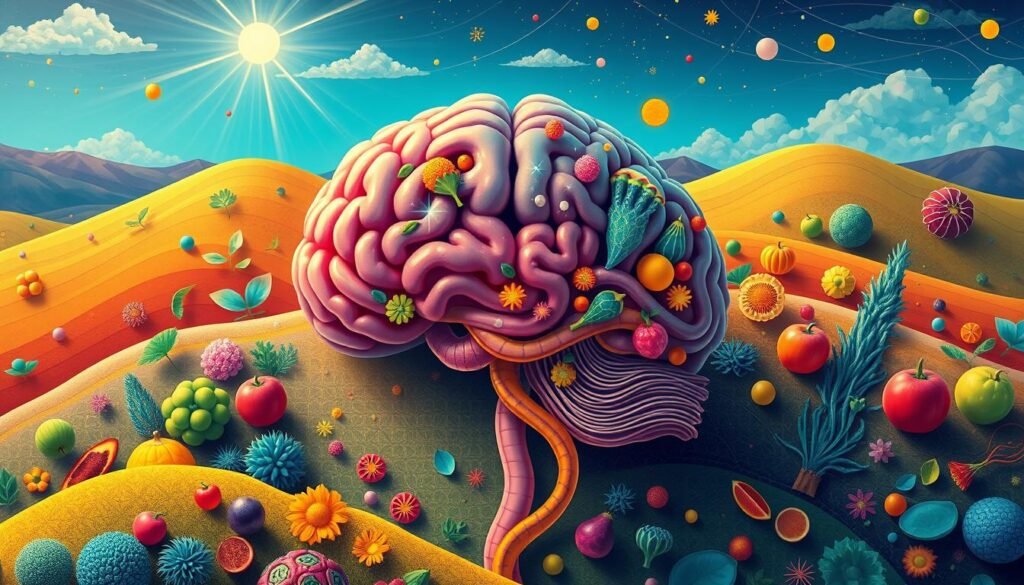Did you know societies low in omega-3 fatty acids often have more depression? This fact shows how important diet is for mental health. Nutritional psychiatry has shown that the right diet may be key to fighting depression.
It’s key to know how food affects your mood. What we eat can help fight depression. This article explores foods that boost mood. These include foods high in antioxidants, omega-3s, and vitamins.
Eating balanced meals rich in these nutrients can greatly help. They contribute to better mental health. This points to a diet full of mood-enhancing foods as central to well-being.
Key Takeaways
- The best diet for depression includes nutrient-rich foods that support brain health.
- Maintaining a balanced intake of vitamins, minerals, proteins, and fatty acids is essential for mood regulation.
- Omega-3 fatty acids found in foods like fatty fish are linked to lower rates of depression.
- Studies suggest that a well-rounded diet can complement traditional approaches to mental health treatment.
- Reducing processed foods and sugars can help improve overall mental well-being.
Understanding Depression and Nutrition
Depression is a complex mental health issue that touches millions. It shows up in many symptoms that change everyday life. The connection between what we eat and our mood is becoming clearer. Nutrition relationship plays a huge role in handling depression. Though no single diet can cure it, eating well may help manage symptoms.
Take, for example, the impact of eating tomatoes on older adults. Those who ate tomatoes two to six times a week were 46% less likely to report depression symptoms. This shows how certain foods can affect our mental health. Foods rich in omega-3 fatty acids and B vitamins can lessen depression symptoms. Plus, eating more low-fat dairy products has been linked to a lower risk of depression.
Drinking enough water is also key. It can cut the risk of feeling depressed or anxious. Changing our diet can make us feel better but it’s not the only answer. Trying a Mediterranean diet could help those with major depression. To learn more, check out this link on the nutrition relationship.
It’s important for people with depression to look at the big picture. This means combining healthy eating with other forms of support. Together, they can help improve mental health.
Why Diet Matters for Mental Health
Eating well is key to good mental health. A balanced diet boosts focus and attention. On the other hand, poor eating habits can make you tired and slow your decision-making. The American Dietetic Association notes that stress can lead to overeating or not eating enough.
Gut bacteria have a big say in our mood. They make about 95% of the body’s serotonin, a happy chemical. Eating fruits, veggies, and omega-3 rich foods, like salmon, is crucial. Bad food choices can lead to inflammation, affecting our mood negatively.
Experts suggest eating complex carbs, lean proteins, and good fats for better brain work. Cutting out junk food helps with focus and energy. Oils from olives, coconuts, and avocados are also good for the brain.
Keeping a food diary can make you more aware of your eating and feelings. A Mediterranean diet can lessen depression, studies show. Adding fruits and veggies to your diet can improve your mood.
Studies show diet and mental health are linked worldwide. The cause and effect are still being researched. The gut-brain connection is gaining interest in health care.
A healthy diet is part of treating mental health well. Mixing good food, exercise, therapy, and sleep can help improve your mood and stability.
Best Diet for Depression
Choosing the right diet can greatly improve your mood and mind. Eating smart helps your brain work better and keep you stable. It’s important to eat a variety of foods for good health. This way, your brain gets what it needs to work well and stay happy.
Role of Nutrients in Brain Function
Certain nutrients make a big difference in how we feel. For example, Omega-3 fatty acids in fish like salmon fight inflammation, which can help with depression. Adding foods high in folate, such as beans, helps with mood control. Eating walnuts regularly can also lower depression levels significantly. These nutrients are key for a healthy brain.
The Importance of a Balanced Diet
Eating a variety of foods is crucial for mental wellness. Fruits, veggies, grains, and lean meats all play a part in a balanced diet. The Mediterranean diet, known for these foods, has been shown to lessen depression. Drinking enough water and cutting down on caffeine and sugars also helps you stay even-keeled. Try to eat five different fruits and vegetables each day for the best benefits to your brain.
Essential Nutrients for Mood Enhancement
Knowing how essential nutrients and mood enhancement connect is key in nutritional psychiatry. Vitamins and minerals help a lot in mental health. They work to reduce symptoms linked with depression. Many nutrients have been studied for their good effects on mood and brain function.
Vitamins and Minerals for Mental Wellness
Adding certain vitamins for mental wellness to our daily diets can make our moods much better. Let’s look at some vital vitamins and minerals and their benefits:
- Vitamin C: Supports neurotransmitter function and eases depression symptoms.
- Vitamin D: Lowers depression rates; not having enough may make things worse.
- B12 and Folate: Needed for making serotonin and dopamine, key for feeling good.
- Magnesium: Fights off stress and anxiety, boosting mental health.
- Selenium: Having too little may link to mood problems.
Antioxidants and Their Impact on Depression
Antioxidants in fruits and veggies are vital for brain health. They fight off oxidative stress, which is connected to depression. Some foods rich in antioxidants include:
| Food | Key Antioxidants | Mood Benefits |
|---|---|---|
| Berries | Flavonoids | Can help with depression-related inflammation. |
| Dark Chocolate | Theobromine | Boosts mood if eaten in moderation. |
| Green Tea | Polyphenols | May reduce signs of depression. |
| Spinach | Vitamins A and C | Aids in mental health overall. |
| Citrus Fruits | Vitamin C | Better neurotransmitter function. |
Studies stress the role of these nutrients in fighting anxiety and depression. Including various foods full of antioxidants can greatly help mental health. Making these nutrients a priority can lead to a healthier mind. It can improve life quality for those dealing with mood issues.
Omega-3 Fatty Acids: The Mood-Boosting Nutrient
Omega-3 fatty acids are key in fighting depression. Studies show that they can lower the risk of depression and mood issues. Millions suffer from depression worldwide. This costs a lot to treat. Omega-3s offer hope for a better mood without needing vitamins.
Low omega-3 levels often mean higher depression rates. Those with depression usually have an imbalance in omega-3 and omega-6 levels. This imbalance can make depressive symptoms worse.
Where can you find omega-3 fatty acids?
- Fatty fish like salmon, sardines, and menhaden
- Plant sources such as flaxseed oil, chia seeds, and walnuts
In the US, omega-3s are the top nonvitamin supplement for all ages. It’s crucial for mental health. The American Heart Association advises eating two fatty fish meals each week. This provides 200-500 mg of EPA and DHA each time. Such habits can naturally improve your mood.
Research is finding how omega-3 helps lessen depression. The National Institute of Health recommends 220 mg of EPA and DHA daily. This can boost mental health. As study continues, it’s clear that omega-3 plays a big role in mental wellness. This means eating right for your brain is becoming more personalized.
Exploring the Gut-Brain Connection
The link between our gut health and mental health is key to our overall health. The gut-brain connection shows how our gut health can change our mood and how we think. Studies show that keeping a healthy gut can help with anxiety and depression. This makes what we eat very important for taking care of our mental health.
How Gut Health Affects Mental Wellbeing
Many studies find that up to 40% of people might experience bowel issues. These can lead to more anxiety and depression. Our gut has over 1000 types of bacteria, with 160 kinds being most common. Important bacteria groups, like Firmicutes and Bacteroidetes, are critical in our bodies. Knowing this, doctors might give antidepressants to help with gut-related mood issues. Treatments like Cognitive Behavioral Therapy (CBT) also help the brain and gut communicate better.
Foods That Promote a Healthy Gut Microbiome
Eating the right foods can really improve your gut health. Foods with probiotics like yogurt and kefir add good bacteria to your gut. A Mediterranean diet increases good bacteria diversity. Plants also boost good bacteria, making fruits and vegetables essential. Eating a variety encourages good bacteria and limits bad ones.
| Food Group | Benefits for Gut Health | Examples |
|---|---|---|
| Fermented Foods | Provide probiotics, enhance microbial balance | Yogurt, kefir, kimchi |
| Fruits and Vegetables | Increase microbial diversity, promote beneficial bacteria | Berries, leafy greens, cruciferous vegetables |
| Whole Grains | Support healthy bacteria growth and gut function | Oats, quinoa, brown rice |
| Legumes | Rich in fiber, enhance gut microbiome health | Beans, lentils, chickpeas |

Serotonin-Boosting Foods
Serotonin helps control your mood and keeping it balanced is key to feeling good. Eating foods that boost serotonin is smart. Foods high in tryptophan, an essential amino acid, are best. Tryptophan is needed to make serotonin. You can find it in turkey, eggs, and dairy products.
Eggs are a great choice because they raise tryptophan levels in the blood. They are packed with nutrients that support brain health. Tofu is also a good option, especially for vegetarians looking for protein.
Salmon is another food that helps increase serotonin. It’s full of tryptophan and also helps keep cholesterol in check. Nuts and seeds are good too. They not only have tryptophan but also are good for your heart.
Carbohydrates are important in moving serotonin around the body. Eating complex carbs, like whole grains, helps with tryptophan absorption. Pineapples are special because they have serotonin. They are a tasty addition to a serotonin-boosting diet.
Low serotonin can affect your memory and mood. People with depression may feel it more when serotonin is low. So, eating foods that boost serotonin is important for staying mentally healthy. Pairing tryptophan-rich foods with foods that support gut health boosts serotonin even more. This shows how closely our gut health and mood are linked.
For more tips on eating for mental health, check out Eating for Mental Health.
The Mediterranean Diet: A Mental Health Powerhouse
The Mediterranean diet is known for helping mental health, especially with depression. It focuses on whole foods and nutrients that battle depressive symptoms. Studies show it improves both physical and mental health.
Key Components of the Mediterranean Diet
The diet has many parts that make it work so well. Here are the main ones:
- Whole grains: They are full of fiber and essential nutrients.
- Fruits and vegetables: These are packed with vitamins, minerals, and antioxidants that are good for your brain.
- Healthy fats: Olive oil is a key fat, rich in omega-3s that help mental health.
- Seafood: It’s a great protein source and has nutrients that make you feel better.
- Nuts and legumes: Full of fiber and healthy fats, they are good for overall health.
Benefits for Depression Management
Many studies show the diet’s strong effect on depression. In the SMILES trial, 31% of people eating this way saw their depression improve. They did better than those who didn’t change their diet. The SUN study also found a 30% lower depression risk for those who followed the diet.
A review showed eating more fruits, veggies, fiber, and fish improves mental health. Yet, many Americans don’t eat enough of these. About 80% of adults don’t eat enough fruit. Almost 90% don’t eat enough veggies.
Eating foods from the Mediterranean diet provides vitamins and minerals vital for mental health. This diet promotes a life with less depression. It’s vital for managing depression well.

| Food Type | Nutritional Benefits | Mental Health Impact |
|---|---|---|
| Fruits | Vitamins, Fiber, Antioxidants | Improved mood, reduced anxiety |
| Vegetables | Vitamins, Minerals, Fiber | Lower risk of depression |
| Seafood | Omega-3 Fatty Acids, Protein | Enhanced cognitive function |
| Nuts and Seeds | Healthy Fats, Magnesium | Better mood regulation |
| Whole Grains | Fiber, B Vitamins | Supportive of overall mental wellness |
Plant-Based Diet and Its Effects on Depression
The plant-based diet is becoming popular for improving mood and managing mental health. This diet includes fruits, vegetables, whole grains, legumes, and nuts. These foods are full of nutrients that help the brain function better. Studies show that eating mostly plant-based foods can lessen depression symptoms. This is important for nutritional psychiatry.
There’s a strong link between the food we eat and how we feel mentally. A study in the American Journal of Health Promotion found less depression and anxiety in people eating vegan for 18 months. Eating well makes a big difference in our well-being.
Our gut health also affects our moods. A study in Nature Microbiology noted that some gut bacteria make mood-related chemicals. People with depression often lack these helpful bacteria. So, what we eat can directly change how we feel.
A high-quality plant-based diet is linked to fewer depressive symptoms. But, a low-quality plant-based diet can increase depression and anxiety risk. Studies have found that poor diets can greatly raise the chance of depression.
Personal stories also show the big impact of eating plant-based on mental health. Many people say they’ve beaten severe depression by changing their diet. These stories support the diet’s positive effects on mental health.
| Diet Type | Risk of Depression | Quality Indicators |
|---|---|---|
| High-Quality Plant-Based | Lower Risk | Rich in fruits, vegetables, whole grains |
| Low-Quality Plant-Based | Higher Risk | Poor nutrient variety, high in processed foods |
| Omnivorous | Moderate Risk | Mixed quality, variable nutrient intake |
| Vegetarian | Moderate Risk | Varies, depends on nutrient choices |
Summing up, a plant-based diet is a promising approach to tackle depression and improve mental health. The nutrients in these foods can make a big difference in feeling better. It’s a key part of nutritional psychiatry.
Foods to Avoid for Better Mental Health
Choosing the right foods greatly impacts how we feel mentally. Some foods worsen depression and anxiety symptoms. It’s vital to know which ones to avoid for better mental wellness.
Processed Foods and Their Negative Impact
Processed foods are high in added sugars, unhealthy fats, and fake ingredients. These can harm mental health. Eating too much white bread, sugary sodas, and pre-packaged sauces often makes depression worse. For example, sugary drinks like soda can mess with how stable your mood is. Even diet sodas may harm more because of their caffeine and how they affect your feelings.
Here are some processed foods to stay away from:
- White bread: Leads to energy dips and mood swings.
- Pre-packaged dressings: High in harmful sweeteners that can cause anxiety.
- Tomato ketchup: Its sugar and sweeteners can make you feel worse emotionally.
Alcohol and Caffeine: The Double-Edged Sword
Drinking a lot of alcohol can mess up your sleep and make anxiety and depression symptoms worse. It can also make it harder to think clearly. Like alcohol, too much caffeine can also be a problem. It can make you more anxious and disturb your sleep, even though a little might make you more alert.
Important things to remember about caffeine and alcohol:
- Energy drinks: They can raise anxiety levels and mess up your sleep because of too much caffeine.
- Caffeine in coffee: Some coffee is okay, but too much leads to anxiety and sleeping problems.
- Trans fats: They’re in many processed foods and can make depression worse, so it’s best to avoid them.

Avoiding these harmful foods is key to better mental health. Eat whole, unprocessed foods like fruits, veggies, and healthy fats instead. This way, you’ll eat better and feel better emotionally and mentally.
Conclusion
In conclusion, the right diet is very important for fighting depression. What we eat greatly affects our mental health and mood. Choosing healthier foods like fruits, vegetables, whole grains, and fats can make a big difference. These foods can make us feel better overall.
Following a Mediterranean diet is especially beneficial. It can improve both our mental and physical health. Foods rich in omega-3s, antioxidants, and vitamins can help stabilize our mood. Studies show that changing our diet can help fight depression in some people.
If you’re dealing with mental health issues, it’s smart to talk to a doctor about your diet. They can give advice tailored just for you. Adding healthier food choices slowly can help you fight depression. For more information, check out research like the studies found at major research articles. These can teach us a lot about diet and mental health.